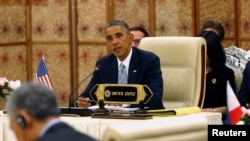U.S. President Barack Obama said he is confident of a "new day" in Myanmar, but added there is work yet to be done to reform the Southeast Asian country.
Obama made his comments Thursday during a meeting with top leaders, including President Thein Sein and longtime democracy activist Aung San Suu Kyi.
Obama is in the middle of a two-day visit to Myanmar, also known as Burma, which is emerging from decades of authoritarian military rule. The president started his visit attending a summit of the Association of Southeast Asian Nations (ASEAN), which Myanmar is hosting this year.
In remarks to the summit Thursday, Obama said he is looking forward to building on what he said is a strong partnership between the U.S. and ASEAN.
"We are very much invested in building the capacity not just of individual nations but between nations so that together we can become stronger more capable partners of each other and meet the regional and global challenges ahead," Obama said.
The president is also taking part in the East Asia Summit, which is a broader gathering of the 10 ASEAN countries plus eight other nations, including the U.S., China, Russia and India.
Will discuss reform issues
White House Deputy National Security Adviser Ben Rhodes said Obama plans to raise concerns over the pace of political reforms and human rights during a one-on-one meeting Thursday with Sein.
A song and dance show and a gala dinner for heads of state in a slick new convention center showed how far Myanmar has come since emerging from decades of military rule and international isolation.
Obama praised Myanmar and Sein for hosting the gathering.
“President Thein Sein, I want to thank you for your hospitality and for bringing together this excellent summit. I think Myanmar has done a tremendous job chairing ASEAN this year and has shown solid leadership on issues of critical importance to the entire region,” Obama said.
But after attending meetings on regional cooperation, Obama got to the more substantial part of his agenda: promoting political reforms in Myanmar that, he said, have not come as fast as many had hoped four years ago when the country began its transition from decades of military rule.
In an interview with a Myanmar magazine, the president said that in the two years since his first visit in 2012, he has seen progress that includes economic reforms, the release of political prisoners, and the beginnings of a constitutional reform movement.
But Obama said there has also been some backsliding. Former political prisoners continue to deal with restrictions while journalists are still facing killings, arrest and harassment.
One area of special concern for the U.S. leader is the condition of the Rohingya people, a Muslim minority of more than 1 million people, most of whom do not have citizenship.
Thousands have been forced to live in camps following clashes with Buddhists in 2012 in Rakhine state.
Politically sensitive issue
The issue of citizenship for Rohingyas is politically sensitive in Myanmar.
Still, Obama planned to bring it up in meetings with both the government and the opposition, including Nobel Peace Prize winner and opposition lawmaker Suu Kyi, whom Obama plans to see in Yangon on Friday.
Suu Kyi has been criticized for not taking a stand on the issue.
Rhodes told reporters here a transition to a stable democracy is not possible without addressing the Rohingya question.
“We recognize that this is a very complex issue here in Burma that they’re deeply held views, that there are contested views of history, but doesn’t change the fact that there are certain fundamental, universal rights that need to apply for all people,” Rhodes said.
After meeting with Suu Kyi on Friday, Obama heads to Brisbane, Australia, for the G-20 summit, where the subject of Ukraine will likely dominate discussions on the sidelines.
Aides said Obama expects to hold talks with European leaders following evidence this week that Russia continues to send equipment and troops across the border into Ukraine.
Among the leaders attending the G-20 summit will be Russian President Vladimir Putin.
Peace Corps
Also Thursday, the United States announced it would set up a Peace Corps program in Myanmar.
It is the latest way in which the U.S. has expanded cooperation with the long-isolated Southeast Asian country.
A White House statement said the first Peace Corps volunteers will arrive in Myanmar in late 2015 and will undergo three months of training before moving to their work sites for two years.








